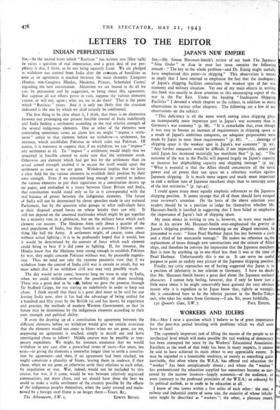JAPAN'S NEW EMPIRE
Sta,—Mr. Simon Harcourt-Smith's review of my book The Japanese "New Order" in Asia in your last issue contains the following remark: " The key to the whole problem—and Dr. Einzig might usefully have emphasised this point—is shipping." This observation is meant to imply that I have omitted to emphasise the fact that the inadequacy of Japan's shipping facilities constitutes the weakest spot of her war economy and military situation. Yet one of my main objects in writing this book was exactly to draw attention to this encouraging aspect of the war in the Far East. Under the heading " Inadequate Shipping Facilities " I devoted a whole chapter to the subject, in addition to many observations in various other chapters. The following are a few of my observations on the subject:
" This deficiency is all the more worth noting since shipping plays an incomparably more important part in Japan's war economy than in Germany's war economy " (p. 88). " It is remarkable that, even though it was easy to foresee an increase of requirements in shipping space as a result of Japan's ambitious conquests, no adequate preparations were made by japan to meet these requirements " (p. 88). " • . shortage of shipping space is the weakest spot in Japan's war economy." (p. 91). "Any further conquests would be difficult, if not impossible, unless and until Japan has increased materially her merchant fleet " (p. 94). " The outcome of the war in the PacifiC will depend largely on Japan's capacity to increase her shipbuilding capacity and shipping tonnage" (p. 94): " What is essential is that the Allies should concentrate all the naval power and air power they can spare on a relentless warfare against Japanese shipping. It is much more urgent and much more important to sink a million tons of Japanese merchant ships than to reoccupy some of the lost territories " (p. 141-42).
I could quote many more equally emphatic references to the Japanese shipping position. It seems strange that all of them should have escaped your reviewer's attention. On the bags of the above selection your readers should be in a position to judge for themselves whether Mr. Harcourt-Smith is justified in suggesting that I have failed to emphasise the importance of Japan's lack of shipping space.
My main object in writing to you is, however, to warn your readers that in his review Mr. Harcourt-Smith over-emphasised the gravity of Japan's shipping problem. After remarking on my alleged omission, he proceeded to state: " Since Pearl Harbour Japan has lost between a sixth and a third of her mercantile tonnage." He makes no reference to. the replacement of losses through new constructions and the seizure of Allied ships, and therefore he conveys the impression that the Japanese merchant fleet is now by anything up to one-third less than it was at the time of Pearl Harbour. Unfortunately this is not so. It can serve no useful_ purpose to paint an unduly rosy picture of the Japanese shipping position., Finally, my critic reproaches me of having suggested that Japan is in a position of inferiority in her relation to Germany. I have no doubt that Mr. Harcourt-Smith knows a great deal about the Japanese national character. I cannot help feeling, however, that if only he knew just a little more about it he might conceivably have guessed the very obvious reason why it is expedient to let Japan know that, rightly or wrongly, she is considered here to be the inferior partner in the Berlin-Tokyo axis, who takes her orders from Germany.—I am, Sir, yours faithfully,


























 Previous page
Previous page